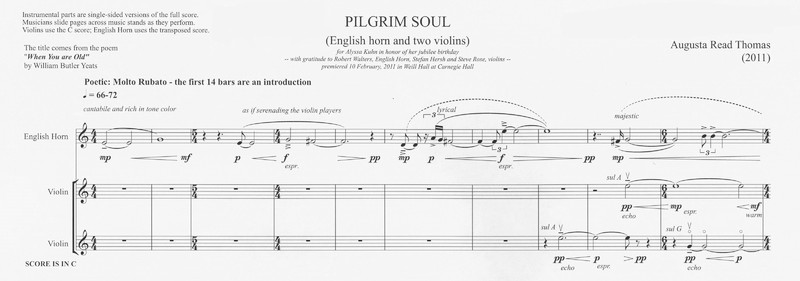-
Score title
-
Pilgrim Soul
-
Composer
-
Augusta Read Thomas
-
Program note
-
Pilgrim Soul was commissioned by Matthew Kuhn as a surprise fiftieth birthday gift for his wife Alyssa Kuhn and it was premiered on her exact fiftieth birthday: 10 February, 2011 at Weill Hall in Carnegie Hall by Matthew Kuhn, English Horn; Alyssa Kuhn, Violin; and Julieta Mihai, Violin.
The music of Augusta Read Thomas is majestic, it is elegant, it is lyrical, it is "boldly considered music that celebrates the sound of the instruments and reaffirms the vitality of orchestral music." (Philadelphia Inquirer) Her deeply personal music is guided by her particular sense of musical form, rhythm, timbre, and harmony. But given the striking individuality and voice, her music is affected by history — in Thomas' words, "Old music deserves new music and new music needs old music." For Thomas, this means cherishing her place within the musical tradition and giving credit to those who have forged the musical paths she follows and from which she innovates. "You can hear the perfumes of my metaphorical grandparents," Thomas states, "there is a wonderful tradition that I adore, I understand, and care about, but I also have my two feet facing forward." Thomas' vision toward the future, her understanding of the present, and her respect for the past is evident in her art, in her teaching, and in her citizenship.
When Director of the Festival of Contemporary Music at Tanglewood last summer, Augusta's welcome-letter started, "Music's eternal quality is its capacity for change, transformation and renewal. No one composer, style, school of thought and practice or historical period can claim a monopoly of music's truths."
Most striking in her music, though, is its exquisite humanity and poetry of the soul. The notion that music takes over where words cease is hardly more true than in Thomas' nuanced and colorful musical voice.
Augusta recounts that Matthew asked for a short work, he also specified its ravishingly beautiful instrumentation, and she remembers that he remarked, "that the general 'tone' of the music was to be introspective, soulful, passionate, showing love, and perhaps even sorrow." Continuing on, Matthew mentioned "I am not interested in a flashy, million-notes-flying-by, dazzling, fanfare-like trio for this 'particular' occasion."
With Matthew's wishes in her mind and ear, she set out to compose a work of soul, melodious beauty, rich long lines, and masterful intricately-woven counterpoint.
Pilgrim Soul was inspired by this beautiful and heartfelt poem by William Butler Yeats:
When You Are Old
When you are old and grey and full of sleep,
And nodding by the fire, take down this book,
And slowly read, and dream of the soft look
Your eyes had once, and of their shadows deep;
How many loved your moments of glad grace,
And loved your beauty with love false or true,
But one man loved the pilgrim Soul in you,
And loved the sorrows of your changing face;
And bending down beside the glowing bars,
Murmur, a little sadly, how Love fled
And paced upon the mountains overhead
And hid his face amid a crowd of stars.
Augusta said about Pilgrim Soul, "Although this music is highly notated, precise, carefully structured, thoughtfully proportioned, and so forth... and as you have 3 independent musicians elegantly working together, from the very specific and nuanced text, I like my music to have the feeling that it is organically being self-propelled — on the spot. As if we listeners, the audience, are overhearing a CAPTURED IMPROVISATION."
"I like my music to be played so that the "inner-life" of the different rhythmic syntaxes is specific, with characterized phrasing of the many colors, characters, and harmonies, etc.— keeping it ultra alive — such that it always sounds spontaneous."
"For their sublime, precision and technical mastery, I deeply thank these musicians who tonight play my notations in this manner."
Recently, Augusta said, "The desire to make music comes from very deep inside and from profound necessity. The urge to make and share music (to communicate, if you will) is vivid, and implied in this passion to express is a recipient of the expression — someone, anyone who is a willing listener. We composers write music that craves a listener and believe that if one creates music that is honest, personal, and human, and is technically and imaginatively elegant in its articulation, it will find its audience — whoever or wherever they may be."
 Augusta Read Thomas
Augusta Read Thomas

